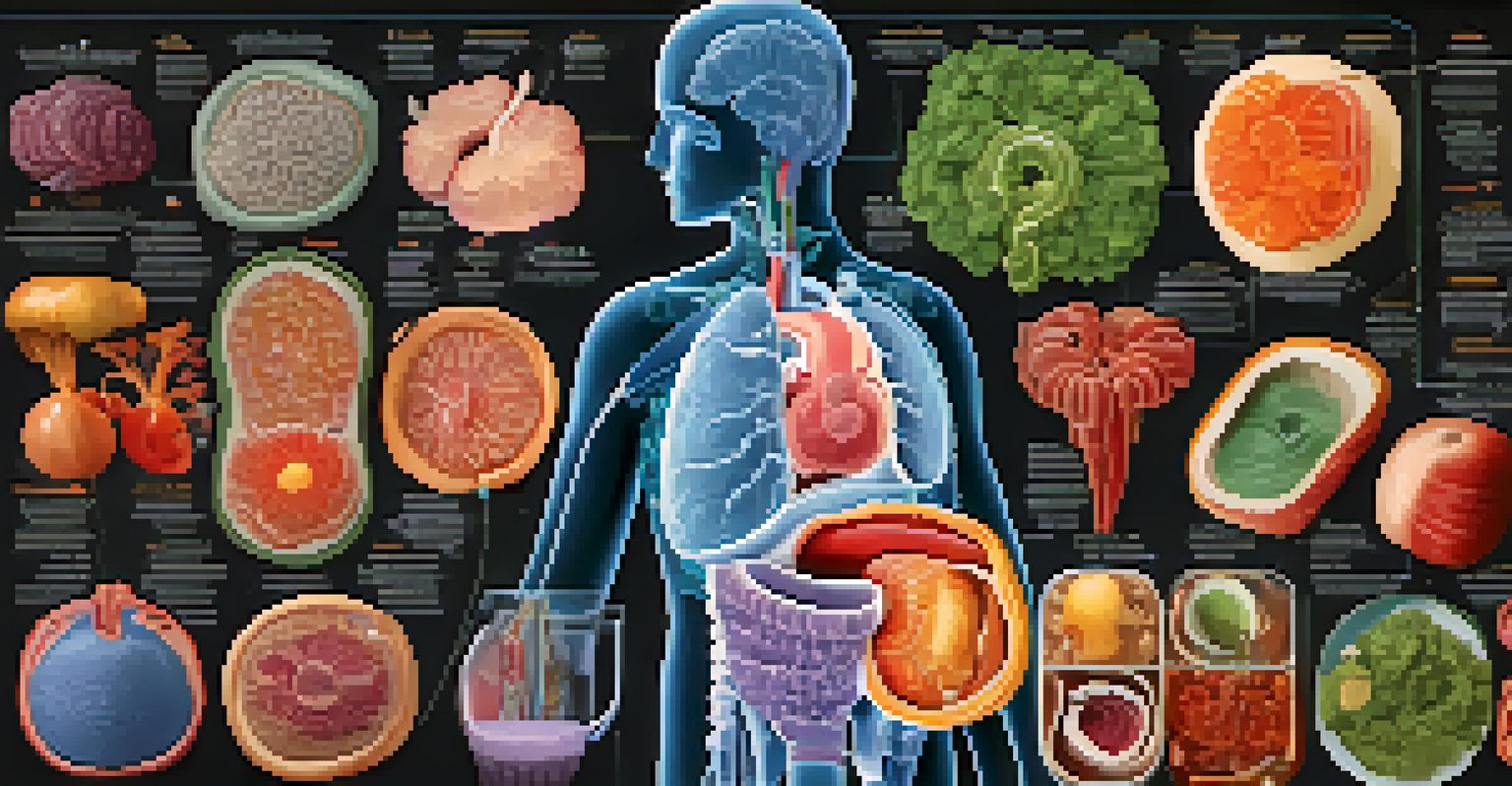Exploring the Impact of Marijuana on Nutritional Absorption

Understanding Nutritional Absorption Basics
Nutritional absorption is the process by which our bodies take in essential nutrients from food. This involves digestion, where food is broken down into smaller components that can be utilized by our cells. Factors such as age, health, and diet can significantly influence how well our bodies absorb nutrients.
You are what you eat, so don’t be fast, cheap, easy, or fake.
For example, someone with a healthy gut may absorb nutrients more efficiently than someone with digestive issues. It’s important to grasp this concept because any factor that disrupts this process can lead to deficiencies or imbalances in nutrition. Understanding the basics sets the stage for exploring how marijuana might play a role.
As we delve into the topic, we’ll see how the interaction between marijuana and our bodies could potentially affect this crucial process of nutrient absorption.
The Role of THC in the Body
Tetrahydrocannabinol (THC) is the primary psychoactive compound in marijuana. When consumed, THC interacts with the endocannabinoid system, which plays a role in regulating various bodily functions, including hunger, mood, and even digestion. This interaction can lead to increased appetite, commonly known as 'the munchies.'

While this can encourage food intake, it doesn’t necessarily guarantee that the nutrients from the food will be absorbed efficiently. In fact, THC can alter gut motility, which may speed up or slow down digestion, potentially impacting nutrient absorption rates. Understanding this aspect is crucial for anyone looking to optimize their nutritional intake while using marijuana.
Nutritional Absorption Explained
Nutritional absorption is crucial for health, as it determines how well our bodies utilize essential nutrients from food.
Thus, while THC has the potential to increase food consumption, its effects on digestion and absorption are complex and warrant careful consideration.
CBD's Influence on Digestion and Absorption
Cannabidiol (CBD), another prominent compound found in marijuana, differs from THC in its effects. Unlike THC, CBD is non-psychoactive and may offer various health benefits without the high. Research suggests that CBD can help reduce inflammation and may even support digestive health, which can play a role in how nutrients are absorbed.
Food is not just what you eat, it's what you absorb.
For instance, individuals suffering from gastrointestinal issues may find relief with CBD, potentially leading to improved nutrient uptake. By promoting a healthier gut environment, CBD could help ensure that the body can efficiently absorb the vitamins and minerals it needs. This is particularly important for those with conditions that impair digestion.
Therefore, while THC may stimulate hunger, CBD might enhance the body's ability to absorb nutrients, making it essential to consider both compounds in discussions about nutritional absorption.
Impact of Marijuana on Appetite Regulation
Marijuana is well-known for its effects on appetite regulation, largely due to THC. This compound stimulates the brain's hunger signals, often leading to increased food consumption. However, this heightened appetite can sometimes lead to poor food choices, which might negatively impact nutritional balance.
For instance, someone may reach for high-calorie snacks instead of nutrient-dense foods, which could lead to weight gain and deficiencies in essential nutrients. It’s a classic case of 'you are what you eat,' and marijuana's impact on appetite can make it a double-edged sword when it comes to nutrition.
THC Affects Digestion Dynamics
While THC can increase appetite, it may also disrupt digestion and nutrient absorption rates.
Thus, understanding how marijuana influences food choices is vital for anyone looking to maintain a healthy diet while using cannabis.
Potential Nutrient Deficiencies from Marijuana Use
While marijuana can stimulate appetite, it may also lead to nutrient deficiencies if not approached mindfully. For example, frequent users might consume more calories but still miss out on vital nutrients if their food choices aren't balanced. This can create a scenario where they may feel full but nutritionally starved.
Certain compounds in marijuana can also affect metabolism and how the body processes nutrients. This is why it’s important for users to be aware of their dietary choices and ensure they are getting a well-rounded intake of vitamins and minerals. Neglecting this can lead to long-term health issues.
Ultimately, being conscious of nutritional needs while using marijuana is essential to avoid potential deficiencies.
Marijuana and Gut Health: A Complex Relationship
The relationship between marijuana and gut health is complex and multifaceted. Some studies indicate that cannabis can help with conditions like irritable bowel syndrome (IBS) and Crohn's disease, which can enhance digestive function. Improved gut health can lead to better nutrient absorption overall.
However, it’s also essential to recognize that marijuana can have varying effects on different individuals. While some may experience relief from digestive issues, others might find that it exacerbates their symptoms, affecting their ability to absorb nutrients properly. This variability underscores the importance of individual experiences with marijuana.
CBD Promotes Gut Health
CBD may enhance nutrient absorption by supporting digestive health and reducing inflammation.
In short, while marijuana can benefit gut health for some, it’s essential to approach its use with caution and awareness.
Best Practices for Nutritional Absorption with Marijuana
To optimize nutritional absorption while using marijuana, consider adopting a balanced approach. Focus on whole, nutrient-dense foods rather than processed snacks, even when the munchies hit. This can help ensure that your body receives essential vitamins and minerals, keeping you healthy and energized.
Additionally, being mindful of how marijuana affects your digestion can guide your choices. If you notice that certain foods don’t agree with you after using marijuana, it might be worth adjusting your diet accordingly. Listening to your body’s cues is key in this process.

By combining mindful eating with an understanding of how marijuana interacts with digestion, you can enhance your nutritional absorption while enjoying the benefits of cannabis.